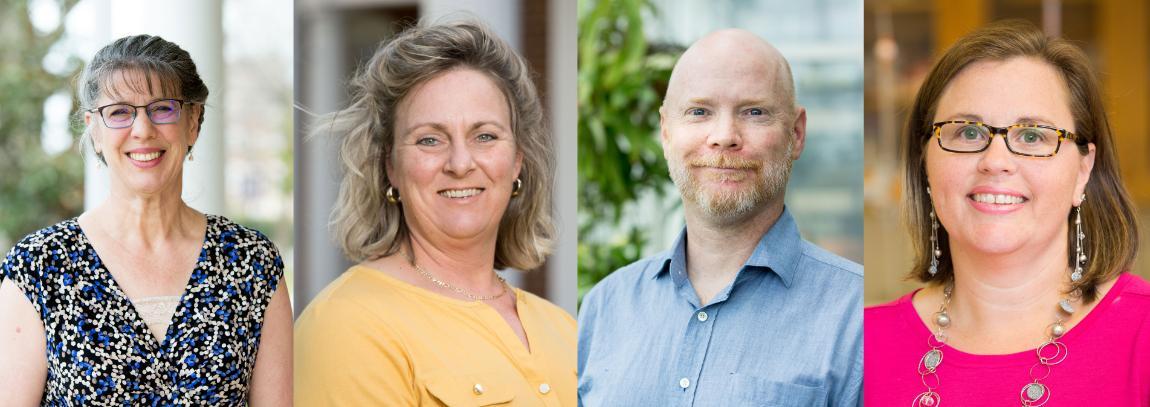

Late last year, the largest gift in Longwood’s history kick-started an engine to create immersive, citizenship-focused courses at sites around the United States – the kinds of unique experiences that students won’t find at any other institution.
Now, that engine is up and running, with the selection announced Monday of the first two Brock Experiences: The first will explore the complexities and challenges of immigration, taking students to neighborhoods of Richmond and Arizona. The other will focus on issues related to the sustainability of Chesapeake Bay waterways and fisheries.
Selected for the two-year faculty fellowships to develop the new courses were Renee Gutierrez (English and Modern Languages) and Connie Koski (Criminology and Criminal Justice), who will collaborate on the immigration course, and Melissa Rhoten (Chemistry) and Mark Fink (Biology), who will create the Chesapeake Bay course.

“Thanks to the generosity of Joan ’64 and Macon Brock, we are on our way to creating an array of wonderful academic experiences led by our finest faculty across the university that will have a profound effect on generations of Longwood students,” said Ken Perkins, director of development for academic priorities and provost emeritus, who served on the selection committee that evaluated faculty proposals. “What is even more exciting is that we will be selecting another pair of proposals to move forward next fall, and another cohort after that, so soon enough these courses will be an unforgettable part of the Longwood experience for a wide number of students.”
These courses will be an unforgettable part of the Longwood experience for a wide number of students.
Ken Perkins, director of development for academic priorities and provost emeritus Tweet This
The faculty proposals that will be selected each year to be developed as a Brock Experience for Transformational Learning are made possible by the $5.9 million gift from the Brocks, the largest in Longwood’s history. There is a two-year development and trial period, after which the course joins other fully developed courses as options for Longwood students.
Modeled after Longwood’s popular and successful interdisciplinary program in Yellowstone National Park as well as one in Alaska, courses will typically take place during the summer, and will involve travel to a place to learn firsthand about an unresolved civic issue from a variety of perspectives.
The “Borderlines” proposal that will be created by Gutierrez and Koski, for instance, envisions incorporating approaches from other disciplines such as education, nursing and environmental science. The pair have collaborated previously on a number of learning projects, including in the Farmville community, where they have brought students to volunteer as English teachers at a local immigration detention center.
We believe in the transformative power of asking students within our disciplines to speak to those who do not look like them, act like them, talk like them, or share their cultures
Renee Gutierrez, assistant professor, Spanish American Literature and Culture to 1900
“We believe in the transformative power of asking students within our disciplines to speak to those who do not look like them, act like them, talk like them, or share their cultures,” Gutierrez wrote in the application. “All students benefit from recognizing the advantages and challenges that immigrants bring to U.S. society.”
The Chesapeake Bay project will build on Rhoten and Fink’s work with the SOLstice program, which brings liberal studies majors and in-service (practicing) teachers to the Bay for a science-focused program that helps prepare them to teach environmental education topics to their own students. The Brock Experience, which will also make use of Longwood’s property on the Bay at Hull Springs Farm, will expand the perspective on fisheries and sustainability issues to a broader range of students and disciplines, such as economics, public policy, sociology and anthropology.
“The Chesapeake Bay, North America’s largest estuary system, is a case study in the connections between science and civic engagement, the power of science to provide key insights into challenging issues, and the limitations of science to effect change in contested civic spheres,” Rhoten and Fink wrote in their application.
“We had several fantastic proposals from faculty members,” said Josh Blakely, who will work with faculty fellows to develop the Brock Experiences. “It was a difficult decision to narrow the field but we couldn’t be more pleased to build on the Yellowstone and Alaska model with these two, and we look forward to working with more faculty in the months ahead to develop their proposals. Eventually, we will have a long and exciting list of Brock Experiences for students to choose from, which will be one of the highlights of a Longwood education.”
